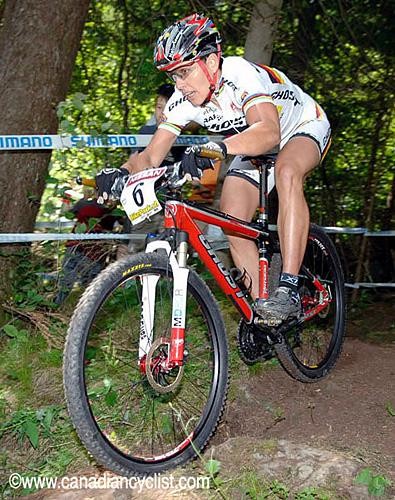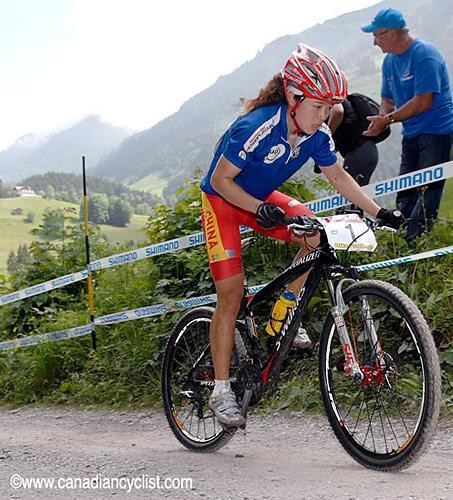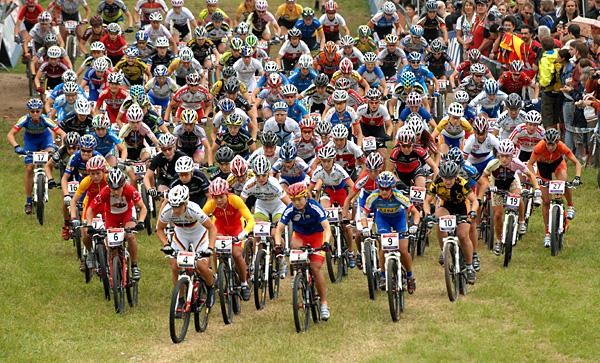Spitz heading full steam to Beijing
Sabine Spitz is heading into her annual rest period, a well-deserved break after a long and...




Part II of an interview with Sabine Spitz, October 12, 2007
After a stellar 2007 season German mountain biker Sabine Spitz has one goal in mind, the Olympic Games in Beijing. To obtain the gold next August, she has been getting ready on all fronts, including a three-day whirlwind trip to China's capital to ride in the Olympic test race. Spitz shared her thoughts on her sporting and life experiences while in the East and her plans to get ready for the Olympics with Cyclingnews' Bjorn Haake.
Sabine Spitz is heading into her annual rest period, a well-deserved break after a long and successful season. Then she will begin preparing for the 2008 season in which the main focus will be the Olympic Games. Having obtained a ninth place in Sydney in 2000 and the bronze medal in Athens in 2004, the logical next step would be the top podium sport in China.
Spitz feels ready to take on the challenge and she dismisses suggestions that at age 35 one has to think about the end of a career. "I have had a great season, probably one of my best years so far. I am not over the top yet, and I still love the sport, so I haven't given any thought to quitting."
She recalled talk from last year, when things didn't go her way. "Last year, some people said that the changing of the guard already had arrived, especially when I finished second to Nina Göhl in the German marathon championships. So this year's results were all the sweeter," Spitz emphasized her continued desire to race at the highest level.
And she doesn't think that her successes only came about because of Gunn-Rita Dahle Flesjå's sickness, which had forced the Norwegian, who is recovering from a viral infection, to take a break from racing since June. "Even starting with last year's World Cup, you could see that our races had changed. Before, it was Gunn Rita-Dahle ahead of everyone else, then five or six of us racing for second."
"This season was much more interesting, with six or seven competing for first place," said Spitz. "In fact, I think throughout the year the women's competition was more interesting than the men's. There, you had [Julien] Absalon going ahead and winning all the time."
Get The Leadout Newsletter
The latest race content, interviews, features, reviews and expert buying guides, direct to your inbox!
With women's races getting more suspenseful, it is hard for Spitz to pick a potential podium for the 2008 Olympics. Instead, she listed half a dozen names, including two Chinese women who can enter the race, based on the Olympic selection criteria. Spitz is definitely impressed with the Chinese women who "will be very motivated on home soil. They also live in a boarding school-like environment, next to the mountain bike course. They have access to the venue year round and will know every centimetre."
Olympic warm-up
Spitz should know, having returned from Beijing's Olympic test race recently. After her bronze medal in Athens in 2004, she is hoping to step up two more spots. The weather should be fine for her. "I am sensitive to the cold. I prefer 30 or 35 degrees centigrade. In the cold my legs freeze up and don't do what my brain tells them to do anymore. When we got to Beijing it was very humid and warm." Spitz also recalled that the first World Cup in 2006 in Netherlands Antilles had similar conditions and she had no problems. So the weather will be ok, but what about the pollution?
She arrived in China on a Thursday, with the air being pretty clear. "We thought, 'What are they all talking about with the pollution?'" Spitz said of her incident-free arrival. "But by Friday it was foggy from the pollution and Saturday [race day] it was like yellow soup in the air." One cause was spotted on the return to the airport Saturday evening. "There were only trucks on the streets, but you could hardly see them, with all the smoke coming out of their exhaust pipes!"
The rest of the setup, however, worked well. "More than for the racers, this was a test for the organizers, to see if they are ready. And everything went very smoothly. They drove us from the hotel to the stadium and the police blocked off intersections and we got waved through all the red lights." Security was also tight. "We had to through X-ray machines, just like at airports, in order to get into the stadium." The procedure planned for the Games passed its test, too. "We did everything according to protocol. The ceremony, the doping control and the press conference went very smoothly." The race itself went well for Spitz, but she'll hope to improve on her second place by the time the real Games roll around.
She liked the course, and comparing it to the courses at this year's Worlds in Fort William, Scotland, and in Athens three years ago, she said, "It's more technical than I was told beforehand. And I am sure they will still add a few more obstacles, like piles of rock, steps and things like that." The many short ups and downs should suit her style. "It's good for a power rider like me." She added, "With the means they had, I think they got a good course together. [Peter] Van Den Abeele, the technical director of the UCI, has been down here and is in constant contact and has an eye on things."
The rise of the Chinese women
Not surprisingly it was Ying Liu of host nation China who took the win, with the above mentioned home course advantage at her disposal. Yet, there are other factors that puzzle Spitz. "Usually it takes quite some time to advance to the world's top [level] in an endurance sport like mountain biking, so it's interesting when people come out of nowhere, like the Chinese women. This seems to happen in other sports, too – especially with the women."
Her thoughts on anti-doping testing were realistic. "It is tough to tackle the doping problem with in-competition controls alone. But it is tough to do the training controls in China. You need a visa to get in to the country and then you need to locate the racers."
She was quick to point out that the women have the work cut out for them anyway, being part of the rigid Chinese system. "I think they get treated pretty roughly and I don't want to know what the [Chinese] coaches yell at them at some of the races." Spitz also noted a different approach to the sport. "I started mountain biking because I was having fun. The Chinese women have more this attitude that they need to win the medal for their country, without personal ambitions."
The system reminded her of those of the Eastern Bloc, before the walls came down. "I think the Chinese have a scouting system, and if they see that someone gets this tall and has those characteristics, they will get steered to a certain sport, like track and field." She also thought that sports is a way for people to improve on their social status in the country, similarly to the way it worked in the East German or in the Soviet systems.
At the test event, there were many volunteers helping out, and they spoke English, something that cannot be said for the local population, which made casual conversations impossible. This is also true for the Chinese racers. "They started to learn a bit, but it doesn't really go past three or four basic sentences of small talk."
Planning ahead
Even though the Olympics are still almost a year away, Spitz and her husband and manager, Ralf Schäuble, already have a plan. It is clear that Spitz really wants to do everything to be prepared as well as possible. But she cautioned, "It's one day, one race," and knows that a bad day, sickness or the weather can spoil all chances for the coveted gold.
The duo already knows the location of the Olympic village, although Spitz said, "It's not really a village from what I experienced in Athens or Sydney. Instead of two-story houses, there are just skyscrapers and it seems that there will be less interaction with athletes from other sports and other nations. You also had the parks, where people could get together."
"We'll see next year, but right now I have a feeling that it will be less interactive." Her plan is to fly somewhere east ahead of time, to be in a similar time zone, "but we haven't scouted out where just yet." The idea is to be in a similar time zone while still enjoying good training conditions. "We will likely arrive on Monday, the race being on Friday. It is unlikely that the course will be open before that."
"In Athens they opened it up about four or five days ahead of time. And we want to avoid the pollution." Spitz clearly has done her homework and with a successful 2007 campaign ended, she will use the same training patterns for next year. And then she'll hope to stand on that top spot next August in Beijing.
To read part I, click here.